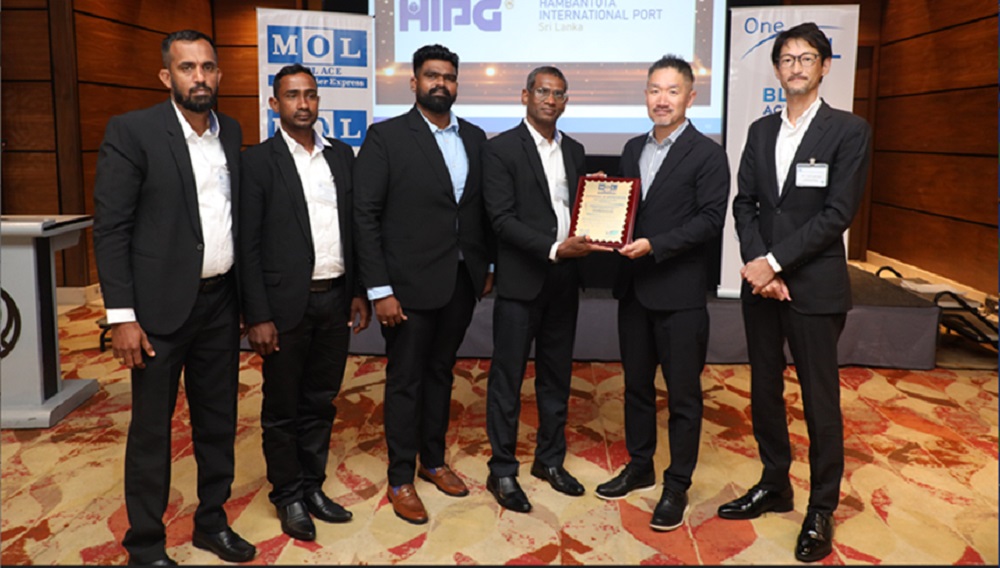
Hambantota International Port (HIP) has once again received international recognition for its outstanding handling of RORO (Roll-On/Roll-Off) transshipment operations. The accolade was presented during MOL’s (Mitsui O.S.K. Lines) Annual Stevedore Meeting for India and Indian Ocean Region, held in Chennai. MOL commended HIP for achieving zero cargo damage and maintaining safe Pure Car Carrier (PCC) cargo handling for the financial year 2023/2024. MOL’s cargo operations at HIP account for an annual average of around 10% of the port’s total RORO volumes, highlighting the strategic importance of this partnership.
To meet MOL’s stringent quality standards, HIP has implemented customised operational practices, including specialised stevedoring and cargo tally procedures, fully aligned with MOL’s 16-point vessel and yard operations checklist. HIP also developed Bulk Terminal Operating System (BTOS) functions to fulfil RORO operational requirements. The system ensures the creation of detailed final reports of ships, including independent cargo deck/hold weight validation, which aids in maintaining vessel stability during navigation.
Innovation and operational excellence
HIP pioneered Sri Lanka’s first Terminal Operating System (TOS) tailored for RORO and bulk operations. The system validates, monitors, and records cargo movements in real-time across vessel, yard, and gate operations, encompassing discharge, loading, re-stow, SOB (Shift On Board-deck to deck), yard shifting, and gate activities. Such innovations have significantly enhanced operational efficiency and safety, setting a benchmark in port management.
The event in Chennai served as a platform to share MOL’s quality control initiatives and exchange insights with business partners involved in PCC cargo operations. This recognition reflects HIP’s commitment to operational excellence and safety in handling unpackaged cargo such as vehicles and machinery, which are particularly vulnerable to damage during transshipment.
“Unlike other finished product cargoes typically transported in containers, RORO operations pose unique challenges due to the absence of protective packaging. Vehicles and machinery are directly transshipped between vessels, making them highly prone to damage. This requires exceptional diligence, specialised skills, and meticulously organised standard operational procedures to minimise risks and ensure safe handling,” says Joey Feng, General Manager Operations of Hambantota International Port Group (HIPG).
Wilson Qu, CEO of HIPG says the port is now well established as a trusted partner for RORO operations. “At Hambantota International Port, we have not only met but exceeded these demands, establishing ourselves as a benchmark for safety and efficiency in the industry.
Our dedication to upholding these high standards has earned us international recognition from industry giants like MOL, reaffirming our position as a trusted and capable partner in the RORO sector.”
Future Expansion Plans
This is the 3rd consecutive year HIP has won recognition from MOL at the shipping company’s Annual Stevedore Meeting. The port received Certificates of Appreciation for maintaining the lowest incident rate in PCC cargo for financial years 2021/2022 and 2022/2023. The current achievement further cements HIP’s reputation for diligence, skill, and adherence to stringent operational protocols.
MOL, a global leader in maritime transportation, operates dry bulkers, tankers, LNG carriers, ferries, coastal RORO ships, and cruise ships. The company also transports dry bulk cargo such as iron ore, coal, grains, wood, cement, fertilizers, and salt. This year’s Stevedore Meeting also focused on damage prevention strategies and the analysis of cargo accidents for the financial year ending March 2024.
Given the port’s proven efficiency, strategic location, and ongoing success in cargo handling, discussions are underway with MOL to increase the annual cargo volumes handled by HIP. This development would position HIP as a key player in regional logistics and further expand its role in the global shipping network.



